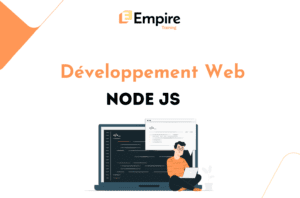Web Development - Node JS
Web development with Node.js involves creating web applications using Node.js, a server-side JavaScript execution platform. Node.js allows developers to use JavaScript on both the client and server side, making it simpler to create applications real-time web, servers API and other dynamic web solutions. Thanks to its speed and scalability, Node.js is widely used for developing websites and interactive web applications, especially in the technology and Internet of Things fields.

Flexible 100% online training
Start your new career at any time! Available part-time? No problem, study at your own pace.

Professional projects
You will develop your professional skills by working on concrete projects inspired by business reality. No problem, study at your own pace.

Personalized support
Benefit from weekly mentoring sessions with a business expert.

Earn certificates and diplomas
Earning certificates and degrees can enhance your career, broaden your horizons, and provide you with increased personal satisfaction.
- Preview
- Projects
- Accompaniement
Node js training objectives
Operational objective :
Know how to develop server applications in JavaScript with Node.js.
Educational objectives :
At the end of Node.js training, you will have acquired the knowledge and skills necessary to:
- Know how the Node.js platform works and common uses
- Know the specifics of server-side programming in JavaScript
- Know how to install and configure a Node.js server
- Know the particularities of asynchronous programming and those of event-driven programming
- Know how to configure and manipulate the Node.js API and its REST API server
- Know how to connect to a database
- Implement Node.js best practices
Who is this training for?
Audience :
This Node.js training is mainly aimed at developers or architects who need to use the JavaScript language on the server side with Node.js, in particular as part of a Vue.js project. The developers or architects involved are intended to design highly concurrent event-driven network applications that can scale up. They can also be called upon to design multiplatform applications involving frameworks such as Ionic or Electron, to design web servers or even Rest APIs.
Prerequisites:
Participants must have a good overall knowledge of the JavaScript language validated in one or more prior development projects. A first approach to a JavaScript framework would be ideal, especially on the client side.

A pedagogy based on practice

- Acquire essential skills by validating professional projects.
- Progress with the help of a professional expert.
- Gain real know-how as well as a portfolio to demonstrate it.
Node js course content:

Server-side JavaScript
Genesis of server-side JS and node.js: from need to reality
The Google V8 engine used on the server side
Why use event-driven programming
Non-blocking approach to an application: advantages and limits
The node.js ecosystem (socketstream, expressjs, etc.)










Getting started with node.js
Installation of the node.js server (deployment, configuration, etc.)
The NPM extension manager (Node Package Manager) or how to extend Nodejs in a few moments (online, local, or global catalog)
First concrete case: Hello World
A web server in a few lines (creation of the basic structure of a web application)
Using Node.js in REPL (Read-Eval-Print Loop).
Function injection in JavaScript or how to pass complex processing to another function










Asynchronous & event-driven programming
What is the point of developing asynchronously?
Event management in detail: react rather than wait
Concrete case for reading streams
Use in databases: heavy processing, nested processing, etc.
Main API modules: console, util, file, events & timer…
Management of HTTP requests/responses. HTTPS.
Creation of child processes, https, TCP and UDP sockets…










Road management
URL parsing (parameters, query, etc.).
Process a request in asynchronous mode.
Set up a route manager.
Practical work
Setting up a route manager.










Web framework
The fundamental concepts of Express.
Construction of an application skeleton.
Configuring Express and the application.
Rendering views with EJS.
Management of forms and file uploads.
URL routing by Express.
Implementation of a REST API.
Practical work
Implementation of a complete REST API.










node.js API overview
Utility functions (console, util, etc.)
Buffer management
Using events and programmable timers
Access to files (reading, writing, various functions)
Management of HTTP requests/responses (and introduction to HTTPS)










A Rest API server in node.js
Reminders about RESTful operation
Manage routes (URL)
The Express bookstore: the generalist
The Restify library: the specialist










Node.js and data access
Introduction to a NOSQL database: MongoDB
Connector for mongoDB: Mongoose The specialist
ORM for any database: Waterline the generalist
Node.js and scalability
Practical work
Management of persistence through an ODM (Object Data Modelisation) with creation of models.










Tools and best practices
Unit testing
Code quality
TypeScript & Node.js
Performance & Safety
Authentication with Passport.js
Individual and privileged supervision.
- Benefit from weekly individual sessions with an expert mentor in the field
- quickly in your projects thanks to its excellence in sharing its know-how




The Empire Training community
- Count on a close-knit community of students ready to help you 24/7.
Online pre-registration
Please fill out the form
Please fill out the form
How does an Empire Training course work?
From the chosen training to their entry into their new career, our students recount each stage of their experience and the support they received.




